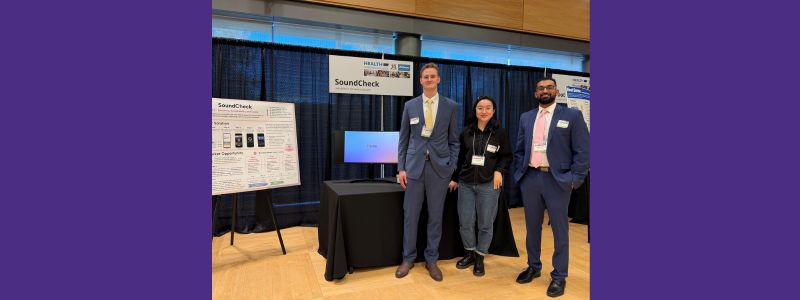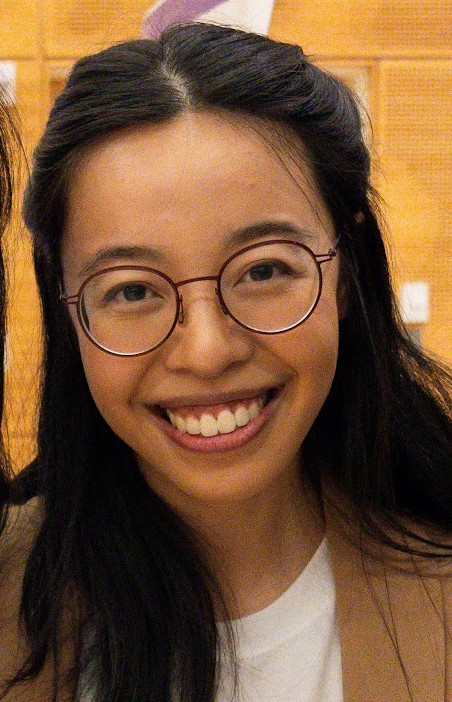
UW Master of Bioengineering students on the SoundCheck team standing at their table at a student competition. From left to right: Will Szymanski, Baolin Niu, Krishna Bathini
In the rapidly evolving field of bioengineering, the bridge between academic knowledge and real-world innovation is often where novel solutions emerge. The UW Master of Applied Bioengineering (MAB) program actively launches students into the world of medical innovation by challenging them to develop practical solutions to pressing healthcare problems. To guide these innovation pursuits, a structured mentorship initiative pairs incoming students with experienced guides from the very start of their academic journey.
Origins and Evolution
The mentorship program was envisioned in 2022 by MAB alumnus Sebastian Bibat (MAB ‘20), who later returned to mentor a team in 2024. When Rupak Rajachar joined the Department of Bioengineering as director of the MAB program, he collaborated with Bibat and Hannah Anderson, bioengineering graduate academic advisor, to expand and strengthen the program.
Our goal is to build a sense of community as the students prepare for fall quarter. Our program is only 10 months in length, so we make every effort to help build a sense of community for each student of an incoming cohort. Rupak Rajachar
Recognizing the importance of continuous improvement, Rajachar solicited feedback from current students and alumni to refine the mentor program. Based on this feedback, Rajachar and Anderson implemented a key change: connecting MAB mentors with new students earlier in the process. Now, students and mentors are matched in June once a student cohort is organized and before they arrive on campus. “Our goal is to build a sense of community as the students prepare for fall quarter,” shared Rajachar. “Our program is only 10 months in length, so we make every effort to help build a sense of community for each student of an incoming cohort.” This timing consideration is especially valuable since many of the students are new to Seattle, and some are new to the United States.
Structure and Team Design
The program employs a thoughtfully designed team structure. A group of three to five students is assigned two mentors:
- A primary mentor who is a faculty member, clinician or both, and who presents a specific project need to the students
- A secondary mentor who is a MAB alumnus with firsthand experience of the project design process
This dual-mentor approach ensures students receive both subject matter expertise and practical guidance from someone who has successfully navigated the program’s challenges. The secondary mentor’s technical skills are carefully matched with the project requirements, providing students with relevant support as they prepare for competitive innovation showcases.
Anderson and Rajachar personally oversee team composition, ensuring each group is balanced with students from different technical backgrounds and includes at least one engineering student. To supplement each team’s skill set, MAB mentors can help with specialized elements of the program where needed.
Project Selection Process
Students are introduced to the range of available projects through clinical pitches and observations, after which they submit a list of their top three project choices. This approach helps match student interests with available opportunities while maintaining balanced teams.
It’s been really rewarding seeing the progress the team has made and I’m happy to have been able to help them out as a mentor. Sherry Gu
Mentor Sherry Gu, who graduated from the MAB program in 2024, has been mentoring the SoundCheck team that is developing an ultrasound probe tester. Gu worked on the project when she was in the program. “The current team has made substantial progress on both the hardware prototype, and especially on the software analysis algorithm that detects the level of damage and determines how impactful that damage is on the probe’s function,” Gu shared. “It’s been really rewarding seeing the progress the team has made and I’m happy to have been able to help them out as a mentor.”
Gu now works in UW Professor Michael Averkiou’s Lab as a research technologist where she is applying some of the skills she learned through the SoundCheck project where she works with both diagnostic and therapeutic ultrasound.

UW Master of Bioengineering mentor and alumna Sherry Gu
Impact and Future Directions
The MAB mentor program exemplifies how structured mentorship can accelerate innovation in bioengineering education. By connecting students with both clinical experts and recent program graduates, the program creates a supportive ecosystem where technical knowledge and practical experience converge.
As the program continues to evolve, Rajachar and Anderson are exploring opportunities to further strengthen industry connections and expand the pool of available mentors. Their goal is to ensure that each new cohort of MAB students not only develops innovative solutions to healthcare challenges but also builds the professional networks and practical skills needed for successful careers in bioengineering. “Empathy and relationship building are as important to the design process as technical skills,” Rajachar said.
The success stories of alumni like Sebastian Bibat and Sherry Gu, who have transitioned from students to mentors, highlight the program’s lasting impact and the valuable cycle of knowledge sharing that benefits both current students and the broader bioengineering community at UW.


